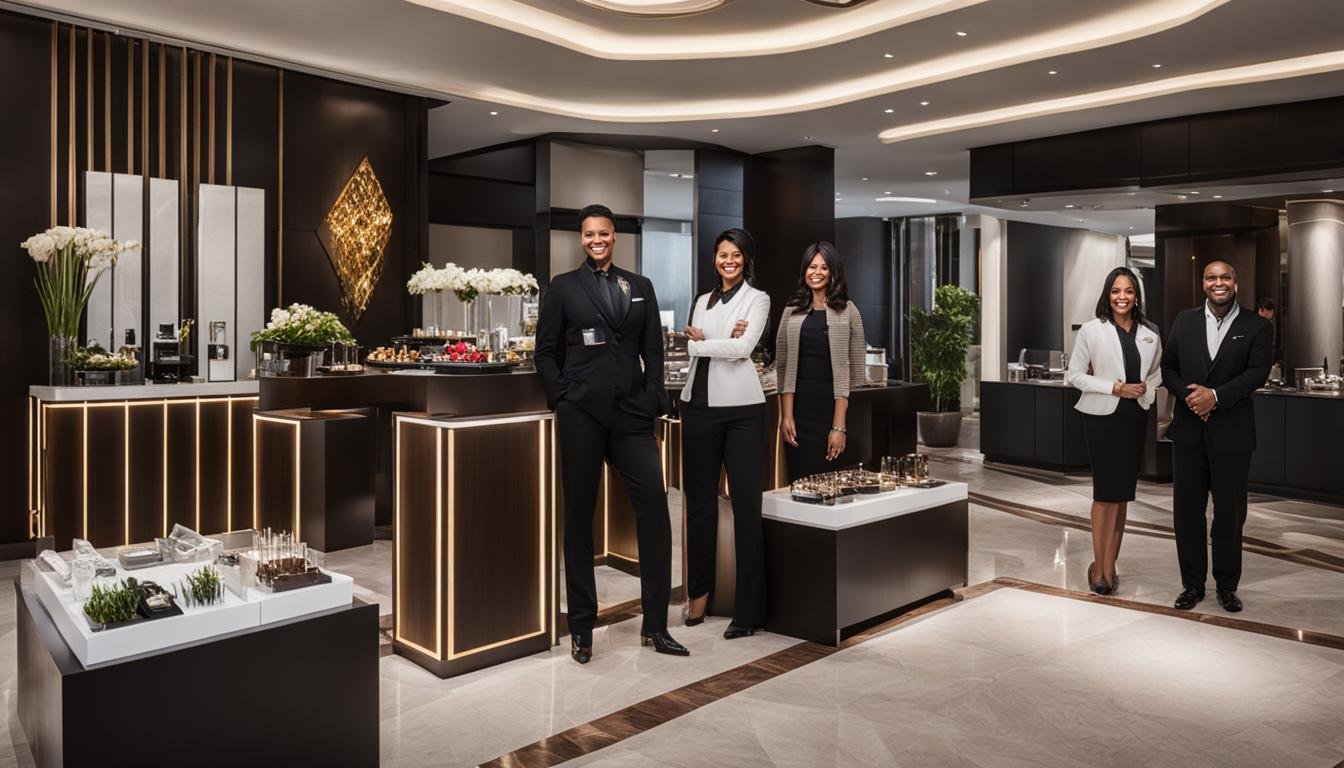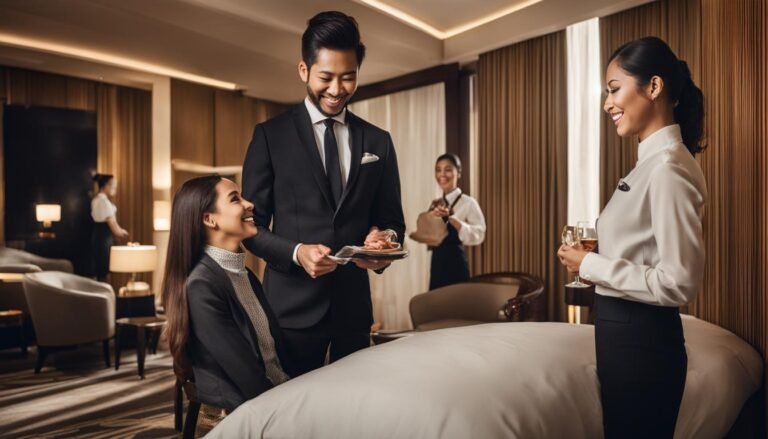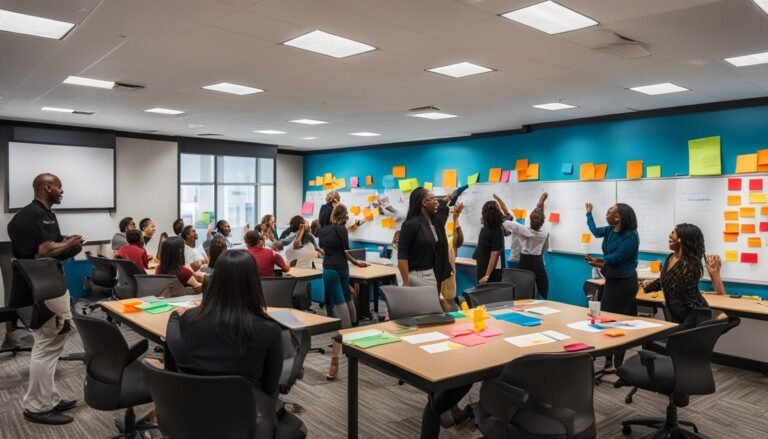The Art of Upselling and Cross-Selling in Hospitality
Welcome to our article on the art of upselling and cross-selling in the hospitality industry. These valuable strategies can help hotels increase revenue, boost sales, and provide enhanced guest experiences. By implementing effective upselling techniques and cross-selling best practices, hotels can tap into the potential of their existing customer base and maximize their profitability.
Upselling involves encouraging customers to pay more for a higher quality product or service. Cross-selling, on the other hand, offers additional products or services related to the original purchase. These strategies leverage customer behavior and the desire for added value, resulting in increased revenue for hotels.
Companies like Amazon have already proven the effectiveness of upselling and cross-selling, generating up to 35% of their revenue through these techniques. Now, it’s the hospitality industry’s turn to embrace these strategies and reap the benefits.
Key Takeaways:
- Upselling and cross-selling can increase revenue and profitability in the hospitality industry.
- Effective upselling techniques and cross-selling strategies can enhance guest experiences.
- The hospitality industry can learn from successful cross-selling practices in other industries, such as retail.
- Personalization and relevance are crucial for successful upselling and cross-selling.
- Technology plays a significant role in optimizing upselling and cross-selling efforts.
What is Upselling and Cross-Selling?
In the fast-paced world of the hospitality industry, sales and marketing strategies play a crucial role in driving revenue and enhancing customer experiences. Two key strategies that have proven to be effective in this industry are upselling and cross-selling. Understanding the concepts of upselling and cross-selling is essential for hoteliers looking to maximize their sales potential and create personalized experiences for their guests.
Upselling involves offering customers a more expensive product or service than their initial intention, thereby increasing their overall spend. This technique taps into customer behavior by enticing them with higher quality or additional features that justify the higher price point. On the other hand, cross-selling involves suggesting complementary products or services that enhance the original purchase. By offering relevant add-ons, hotels can enhance the guest experience and generate additional revenue.
These strategies are highly effective because they align with customer behavior and their desire for added value. Customers are more likely to spend more when they perceive the additional product or service as enhancing their overall experience. Successful implementation of upselling and cross-selling techniques can result in increased revenue, improved customer satisfaction, and a competitive edge in the hospitality industry.
The Upselling and Cross-Selling Process:
- Understanding customer needs and preferences
- Identifying suitable upselling and cross-selling opportunities
- Presenting the options in a persuasive and personalized manner
- Highlighting the added value and benefits
- Closing the sale by addressing any objections
Implementing upselling and cross-selling strategies requires a deep understanding of customer behavior and preferences. By analyzing guest data and tracking purchasing patterns, hotels can identify the most suitable opportunities for upselling and cross-selling. This data-driven approach enables hotels to personalize their offers and ensure they resonate with the individual guest. Through effective communication and a focus on delivering value, hotels can successfully implement upselling and cross-selling techniques to enhance guest experiences and drive revenue in the hospitality industry.
| Upselling | Cross-Selling |
|---|---|
| Involves persuading customers to purchase a more expensive product or service than their initial intention | Offers complementary products or services related to the original purchase |
| Increases revenue by encouraging customers to spend more | Enhances the guest experience and adds value to the original purchase |
| Aligns with customer behavior and desire for added value | Provides opportunities to enhance customer satisfaction and loyalty |
| Involves personalized communication and highlighting the benefits of the higher-priced option | Suggests additional products or services that complement the original purchase |
Benefits of Upselling and Cross-Selling in Hospitality
Implementing upselling and cross-selling techniques in the hospitality industry can bring a range of benefits to hotels. By effectively upselling and cross-selling, hotels can enhance guest satisfaction, increase revenue, and improve overall profitability.
One of the primary benefits of upselling and cross-selling is the positive impact it has on guest satisfaction. When hotels offer additional products or services that align with a guest’s needs and preferences, it creates a personalized experience that exceeds expectations. This, in turn, leads to higher levels of guest satisfaction and increased loyalty.
In addition to guest satisfaction, upselling and cross-selling also contribute to increased revenue. By offering higher-quality products or additional services, hotels can capture additional revenue from their existing customer base. Upselling and cross-selling are particularly cost-effective strategies as it is easier and less expensive to sell to existing customers than to acquire new ones.
Another advantage of upselling and cross-selling is the opportunity to gather rich guest data. By analyzing the products or services that guests are interested in, hotels can gain valuable insights into their preferences and behavior. This data can then be used for future personalization efforts and targeted marketing campaigns, further enhancing the guest experience and driving revenue.
The Benefits Summarized:
- Enhanced guest satisfaction and loyalty
- Increased revenue and profitability
- Cost-effective strategy for selling to existing customers
- Opportunity to gather rich guest data for personalization
Table: Revenue Increase Through Upselling and Cross-Selling
| Hotel | Revenue Increase |
|---|---|
| Hotel A | $500,000 |
| Hotel B | $750,000 |
| Hotel C | $1,000,000 |
“Upselling and cross-selling techniques in the hospitality industry have proven to be highly effective in increasing guest satisfaction and revenue. By offering personalized upgrades and additional services, hotels can create memorable experiences that keep guests coming back.”
Overall, the benefits of upselling and cross-selling in the hospitality industry are clear. From improved guest satisfaction to increased revenue, hotels can capitalize on these strategies to enhance their business and provide exceptional experiences for their guests.
Products and Services Suitable for Upselling and Cross-Selling in Hospitality
Upselling and cross-selling in the hospitality industry offer a range of opportunities to provide additional value to guests and increase revenue. By identifying the right products and services to offer, hotels can enhance the guest experience and generate more sales. Here are some of the key products and services that are suitable for upselling and cross-selling:
Room Upgrades
One of the most common and effective upselling options in the hospitality industry is room upgrades. By offering guests the opportunity to upgrade to a better room with enhanced amenities or a better view, hotels can provide a more luxurious experience and increase revenue.
Special Offers
Special offers can be a great way to cross-sell additional products or services to guests. This could include packages that combine accommodations with activities or amenities, such as breakfast in bed, a bottle of wine, or access to the hotel’s exclusive spa facilities. These offers can enhance the guest experience and encourage guests to spend more.
Leisure Services
Hotels can also cross-sell leisure services to guests, such as bike rentals, access to fitness facilities, or partnerships with local tour guides. By recommending and offering these services, hotels can provide added convenience and help guests make the most of their stay.
Spa and Relaxation
Spa and relaxation services are another popular option for upselling and cross-selling in the hospitality industry. Offering guests the opportunity to book spa treatments, massages, or other wellness services can enhance the guest experience and provide an additional source of revenue for hotels.
Transfers and Parking
Upselling transportation and parking services can also be a valuable revenue stream for hotels. This could include offering guests the option to book airport transfers, valet parking, or secure parking spaces. By providing convenient transportation options, hotels can offer additional value to guests and increase their revenue.
Table: Key Products and Services Suitable for Upselling and Cross-Selling in Hospitality
| Product/Service | Description |
|---|---|
| Room Upgrades | Offering guests the opportunity to upgrade to a better room with enhanced amenities or a better view. |
| Special Offers | Package deals that combine accommodations with additional amenities or experiences. |
| Leisure Services | Offering guests access to leisure services such as bike rentals, fitness facilities, or partnerships with local tour guides. |
| Spa and Relaxation | Providing guests with the option to book spa treatments, massages, or other wellness services. |
| Transfers and Parking | Upselling transportation and parking services, such as airport transfers or valet parking. |
By offering these products and services as upselling and cross-selling options, hotels can enhance the guest experience, increase revenue, and create a more personalized stay for their guests.
How and When to Upsell in Hospitality
Upselling in the hospitality industry requires a strategic approach that maximizes value for both the hotel and the guest. By understanding the sales cycle and leveraging technology, hotels can effectively upsell and increase their revenue. Here are some key considerations for implementing successful upselling techniques:
- Optimize your website: Start by optimizing your hotel’s website to showcase upselling options and their value proposition. Use enticing visuals, clear descriptions, and compelling calls-to-action to encourage guests to explore additional upgrades or services.
- Utilize pre-arrival emails: Pre-arrival emails are a great opportunity to promote additional products or services to guests who have already made a booking. Highlight the benefits and exclusivity of these offerings, emphasizing how they can enhance their overall stay.
- Train your staff: It is essential to train your staff on upselling techniques and provide them with the knowledge and skills to offer additional value in a non-pushy manner. Teach them to identify guests’ needs and preferences, and empower them to make personalized recommendations that align with those preferences.
- Integrate technology: Technology can greatly facilitate the upselling process. Consider integrating features like push notifications or personalized offers based on guest preferences into your hotel’s mobile app or website. This allows you to deliver targeted offers at the right time, increasing the likelihood of conversion.
Remember, successful upselling is all about finding the right moment and approach to offer additional value to your guests. By following these strategies and incorporating upselling throughout the sales cycle, you can enhance the guest experience and boost your hotel’s revenue.
| Upselling Tips | Effectiveness Level |
|---|---|
| Highlight benefits and exclusivity | High |
| Offer personalized recommendations | High |
| Utilize push notifications | Medium |
| Train staff on upselling techniques | High |
How and When to Cross-Sell in Hospitality
In the hospitality industry, cross-selling is a strategic approach to offer additional products or services that complement the guest’s original purchase. By providing relevant and personalized recommendations, hotels can enhance the guest experience and increase revenue. To effectively cross-sell in the hospitality industry, it’s important to consider different touchpoints along the guest journey.
Pre-Booking Offers
One opportunity for cross-selling is through pre-booking offers. Hotel websites can showcase additional services or experiences that guests can add to their booking. For example, if a guest is booking a room for a romantic getaway, the website can highlight spa packages or candlelit dinner options. By presenting relevant cross-selling options during the booking process, hotels can entice guests to enhance their stay before they even arrive.
Post-Booking Emails
Post-booking emails provide another avenue for cross-selling in hospitality. After a guest has made a reservation, hotels can send follow-up emails with personalized recommendations. For instance, if a guest has booked a family vacation, the hotel can suggest nearby attractions or activities suitable for children. These emails can also include exclusive offers and upgrades, incentivizing guests to enhance their stay further.
Front Desk Upselling
Front desk upselling is a valuable technique for cross-selling in hospitality. During check-in, well-trained staff can make personalized recommendations based on the guest’s needs and preferences. For example, if a guest mentioned an interest in golf, the front desk staff can offer information about nearby golf courses or arrange tee times. By leveraging face-to-face interactions, hotels can effectively cross-sell additional services and experiences that resonate with guests.
By leveraging pre-booking offers, post-booking emails, and front desk upselling, hotels can tap into the potential of cross-selling in the hospitality industry. These techniques allow hotels to provide personalized recommendations, enhance the guest experience, and boost revenue. However, it’s essential to ensure that cross-selling efforts are genuine and add value to the guest’s stay, as guest satisfaction should always remain a top priority.
Table: Example Cross-Selling Opportunities in the Hospitality Industry
| Guest Type | Original Purchase | Cross-Selling Opportunities |
|---|---|---|
| Families | Room reservation | Theme park tickets, children’s activity packages |
| Business travelers | Room reservation | Meeting room rental, business center services |
| Couples | Room reservation | Spa treatments, romantic dinner packages |
By understanding the guest’s profile and aligning cross-selling opportunities with their needs and preferences, hotels can create a seamless and personalized guest experience.
Training Staff for Upselling and Cross-Selling in Hospitality
Staff training is a critical component of successful upselling and cross-selling in the hospitality industry. By equipping employees with the necessary skills, knowledge, and techniques, hotels can optimize their revenue potential and provide exceptional customer service. Effective training ensures that staff members understand the value of upselling and cross-selling, and are able to offer personalized recommendations that cater to the guest’s individual needs and preferences.
During training, employees should be educated on various upselling techniques and cross-selling strategies that align with the hotel’s products and services. They should learn how to effectively pitch additional offerings, respond to objections, and avoid being too pushy or aggressive. Customer service training is also essential, as staff members need to provide a positive and friendly experience while promoting upselling and cross-selling opportunities.
In addition to traditional training methods, technology can play a role in enhancing staff training for upselling and cross-selling. Virtual simulations and interactive modules can provide practical examples and allow employees to practice their skills in a controlled environment. Role-playing exercises and real-life scenarios can also be utilized to help staff members develop confidence and refine their upselling and cross-selling techniques.
By investing in comprehensive staff training, hotels can empower their employees to effectively upsell and cross-sell, resulting in increased revenue, enhanced guest satisfaction, and a personalized experience that sets their property apart from the competition.
Key Training Elements for Successful Upselling and Cross-Selling
- Understanding the hotel’s products and services
- Learning various upselling and cross-selling techniques
- Effective communication and customer service skills
- Building product knowledge and familiarity
- Recognizing opportunities and making personalized recommendations
- Handling objections and overcoming resistance
- Avoiding being too pushy or aggressive
- Utilizing technology for training and practice
Leveraging Technology for Upselling and Cross-Selling in Hospitality
In today’s digital age, technology plays a crucial role in the success of upselling and cross-selling efforts in the hospitality industry. By harnessing the power of technology, hotels can create personalized offers, gather valuable guest data, and deliver targeted promotions through mobile apps and push notifications.
One of the key advantages of using technology for upselling and cross-selling is the ability to provide personalized offers based on guest preferences and behavior. By analyzing guest data, hotels can understand their preferences, previous purchases, and stay history to offer relevant and attractive upsell or cross-sell options. This level of personalization increases the chances of conversion and enhances the guest experience.
| Benefits of Technology for Upselling and Cross-Selling | |
|---|---|
| 1. Personalized Offers | Technology enables hotels to create tailored offers based on guest preferences and behavior, increasing the likelihood of upselling and cross-selling success. |
| 2. Guest Data Collection | Through technology, hotels can gather rich guest data, including preferences, stay history, and purchasing behavior, to inform future upselling and cross-selling efforts. |
| 3. Mobile Apps | Mobile apps provide a convenient platform for offering upsells and cross-sells directly to guests, allowing for seamless and instant transactions. |
| 4. Push Notifications | Push notifications deliver targeted offers to guests’ mobile devices, ensuring that they receive timely and relevant promotions. |
Furthermore, mobile apps offer a convenient and accessible platform for hotels to offer upsells and cross-sells directly to guests. With the rise of smartphones, guests can easily browse and book additional products or services through a mobile app, enhancing their overall experience. Mobile apps also provide a channel for delivering push notifications, which can be used to send targeted offers and reminders to guests, increasing the likelihood of conversion.
With technology, hotels can leverage data-driven insights and real-time communication channels to engage guests with personalized offers and enhance their overall experience.
In summary, leveraging technology is essential for successful upselling and cross-selling in the hospitality industry. By utilizing personalized offers, gathering guest data, employing mobile apps, and utilizing push notifications, hotels can optimize their upselling and cross-selling efforts, providing a seamless and personalized guest experience.
Upselling and Cross-Selling in Group Sales in Hospitality
In addition to individual guest bookings, upselling and cross-selling can also be applied to group sales in the hospitality industry. When organizing events or group stays, hotels have the opportunity to offer personalized value and event enhancements that can significantly enhance the guest experience while generating additional revenue.
When it comes to upselling in group sales, hotels can offer various options to event organizers and group planners. These options may include room upgrades, such as larger suites or rooms with better views, as well as additional services such as audio-visual equipment or dedicated event setup assistance. By tailoring these upselling options to the specific needs and preferences of the group, hotels can provide a higher level of personalized value, making the event more memorable for attendees.
Cross-selling in group sales involves offering additional products or services that complement the main event. For example, hotels can suggest additional amenities, such as spa treatments or dining experiences, that participants can enjoy during their stay. By presenting relevant cross-selling offers, hotels can enhance the overall group experience and provide opportunities for guests to explore and enjoy the full range of services the hotel has to offer.
| Upselling in Group Sales | Cross-Selling in Group Sales |
|---|---|
| Room upgrades (e.g., larger suites, better views) | Additional amenities (e.g., spa treatments, dining experiences) |
| Audio-visual equipment rental | Special packages or discounts for group activities |
| Dedicated event setup assistance | Transportation services for group outings |
By incorporating upselling and cross-selling into group sales, hotels can create a more personalized and memorable experience for their guests. Not only does this enhance guest satisfaction, but it also provides the opportunity to increase revenue while building stronger relationships with event organizers and group planners.
Ultimately, the success of upselling and cross-selling in group sales relies on understanding the specific needs and preferences of the group, and aligning the offers with those requirements. By tailoring the offers to the group’s expectations and delivering exceptional service, hotels can elevate the overall guest experience and maximize their revenue potential.
Incorporating Upselling and Cross-Selling into Hotel Sales Cycle
In order to maximize revenue and provide a tailored guest experience, it is important for hotels to incorporate upselling and cross-selling strategies throughout the hotel sales cycle. By strategically offering additional products and services at various touchpoints, hotels can enhance the guest experience and generate incremental revenue. Here are some key opportunities to incorporate upselling and cross-selling into the sales cycle:
Website Offers and Booking Page Enhancements
One of the first opportunities to engage guests with upselling and cross-selling is through the hotel’s website. By showcasing enticing offers and enhancements on the website, hotels can capture the attention of potential guests and encourage them to consider additional purchases. This can include highlighting room upgrades, special packages, or exclusive amenities that guests can add to their booking. By enhancing the booking page with relevant offers, hotels can increase the likelihood of guests adding extra items to their reservation.
Confirmation Emails with Upselling Opportunities
After guests have completed their booking, confirmation emails provide another opportunity to offer upselling and cross-selling options. These emails can include personalized recommendations based on the guest’s preferences or past behaviors. For example, if a guest has booked a spa package, the hotel can suggest additional spa treatments or wellness experiences that complement their reservation. By providing targeted upselling opportunities in confirmation emails, hotels can further enhance the guest’s anticipation and excitement for their upcoming stay.
Check-in Upselling and Post-Stay Emails
During the check-in process, hotel staff can engage in upselling and cross-selling by providing personalized recommendations based on the guest’s needs and preferences. This can include offering upgrades, adding on amenities, or suggesting additional experiences that the guest may enjoy. By training staff to effectively pitch these offerings and respond to guest inquiries, hotels can capitalize on the opportunity to increase revenue during the guest’s stay.
After the guest has checked out, post-stay emails can be used to nurture the relationship and encourage future bookings. These emails can include exclusive offers or incentives for the guest’s next stay, such as discounted rates, complimentary upgrades, or loyalty program benefits. By continuing to offer value and personalized recommendations even after the guest has left, hotels can foster guest loyalty and generate repeat business.
By incorporating upselling and cross-selling into various stages of the hotel sales cycle, hotels can optimize revenue potential and provide a tailored guest experience. From website offers and booking page enhancements to confirmation emails, check-in interactions, and post-stay communication, each touchpoint presents an opportunity to engage guests with additional value and services.
Conclusion
Upselling and cross-selling are key strategies in the hospitality industry that can significantly boost revenue and enhance guest satisfaction. By offering additional value and personalized experiences, hotels have the opportunity to create memorable stays for their guests while increasing their profitability.
The hospitality industry thrives on delivering exceptional guest experiences, and upselling and cross-selling play a vital role in achieving this goal. By identifying suitable products and services to upsell and cross-sell, hotels can tailor their offerings to meet the unique preferences and needs of each guest.
When executed effectively, upselling and cross-selling not only generate additional revenue but also promote guest loyalty. By understanding their customers and providing personalized upselling and cross-selling opportunities, hotels can create a sense of exclusivity and enhance the overall guest experience.
By integrating these strategies throughout the sales cycle, training staff to execute them with finesse, and leveraging technology to deliver targeted offers, hotels can optimize their revenue potential and ensure that every guest enjoys a personalized and memorable stay. Upselling and cross-selling are powerful tools in the hospitality industry and should be embraced by hoteliers looking to drive revenue growth and exceed guest expectations.







